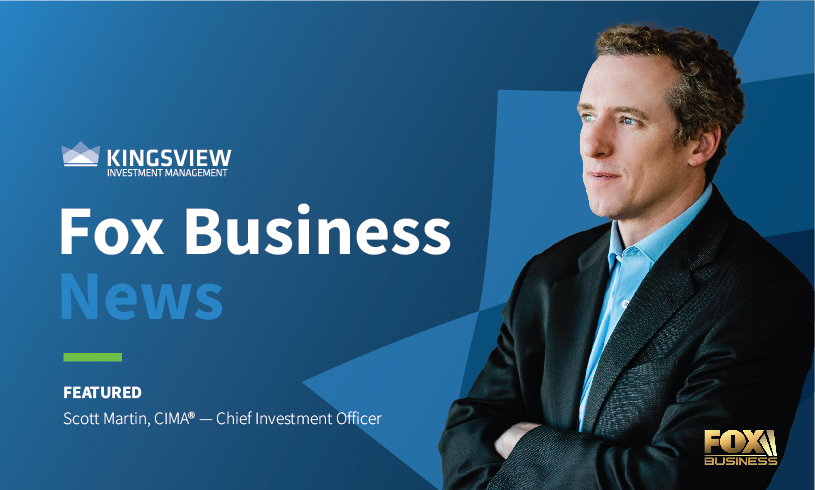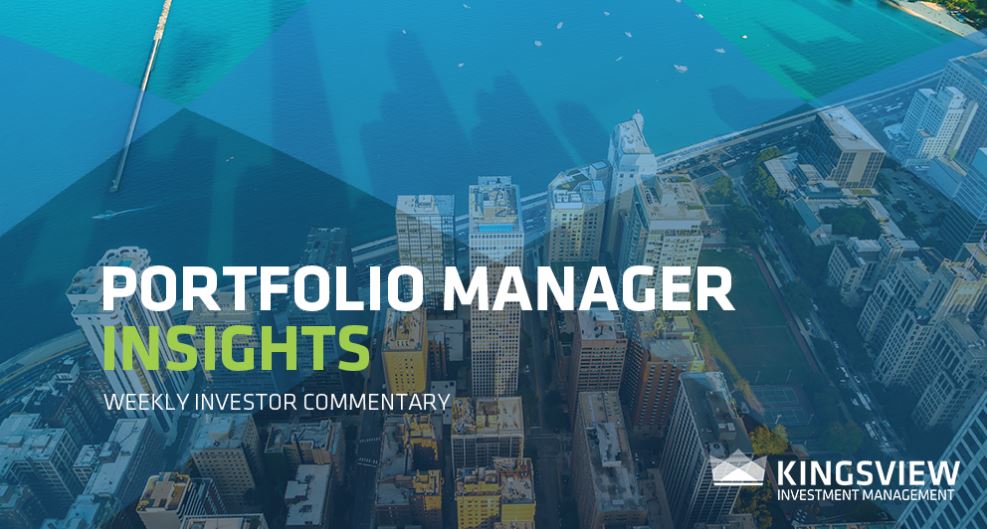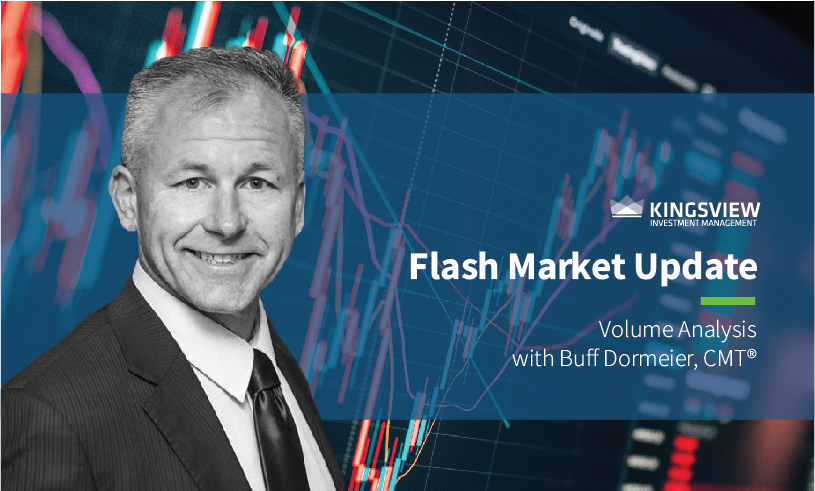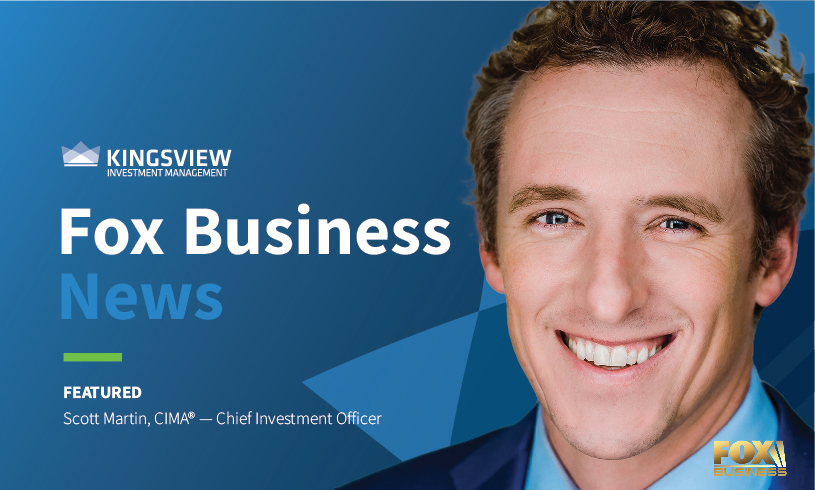Kingsview CIO Scott Martin on Fox Business Making Money with Charles Payne 2.10.23

Click here to listen to the full interview.
Program: Making Money with Charles Payne
Date: 2/10/2023
Station: Fox Business News
Time: 2:00PM
LAUREN SIMONETTI: Let’s talk more about this. We have Main Street Asset Management CFO Erin Gibbs, in Kingsview Wealth Management CIO Scott Martin. Welcome to both of you. You match the pink. It’s like an early Valentine’s Day special here. Let’s start with the message. Yeah. It’s the worst holiday of the year. Lip shares are sinking. Last check, they were down over 30%. Bad earnings reporting a net loss of, what, $600 Million in the quarter, twice what it lost a year ago because Uber is eating its lunch. Expedia is also down today on missed earnings and revenue. Erin, I want to go to you first on this. Taken together, what does this tell you about the consumer?
ERIN GIBBS: I think there’s a really interesting story about broad consumer and then very specific pockets that are doing well. And overall, we know that consumer savings are going down. We know that people are going to be more cautious about where they spend their money on how much they’re going to spend on. I think it’s there’s definitely going to be more compression in some of those, particularly the companies that were very highly valued, missing those earnings. They should get hurt really hard if you’re going to miss your earnings by that much and not revise your expectations down. I think there are the few pockets of safety are basically travel and leisure is really the one area where we haven’t seen those earnings being revised back down.
SIMMONETTI: Isn’t Expedia a travel company as well?
GIBBS: Yeah, you would agree?
SIMMONETTI: I asked my question with a question mark myself.
GIBBS: No, no, no. So, yes, absolutely. Expedia being one of those companies that’s missing it. But Booking.com, all the airlines, restaurants, that sort of thing. So yeah, as Expedia being the one exception in that in that group, very fair. And then also travel and leisure also focused on Europe has also been doing you like really well yes and I do like Europe I think that’s one of those areas that’s been performing outperforming since the beginning of year, but even has been holding up much, much better in the past two weeks than we’ve seen in the US, both in large caps and in small caps.
SIMMONETTI: Scott, come in here. What do you want to say?
SCOT MARTIN: I like the travel and leisure call. Lauren I think also you’ve got to look at hotels to something like Marriott has been hanging in there pretty well. Obviously, the airlines as well, because folks are traveling, whether it’s domestic or international. Also, I think Visa and MasterCard, too, tied to the consumer, but a necessary evil, if you will. So if you look at how much consumers are using the plastic, I think Visa and MasterCard are ways to kind of gauge how the consumer is doing. And the consumer is hanging in there, even though there are some companies that are suffering, like you mentioned, with Lyft versus Uber, but the consumer is still spending. They’re just being very choosy about where they go and what they.
SIMMONETI: Do and ringing up the balance. Right. Let’s pivot to to earnings season. It was half of the S&P, Aaron, reported earnings this week so far OK. What’s your Take?
GIBBS: Actually no this is one of the worst earnings seasons. When we talk about beat rates and miss rates, we even had an earnings season this bad since the first first quarters of the pandemic. The beat rate is about 10% lower than normal than the five year average. And the miss rate is about 10% higher. So we’re looking at 28% in companies missing versus an average of 17. That’s a big difference. We’re talking like an additional 10% of companies in the S&P 500 missing their estimates.
SIMMONETI: Scott, it seems to me that investors don’t care about earnings right now because the market keeps going up, up and up. Right. I mean, Aaron just said it’s one of the worst earnings we’ve seen in a while.
MARTIN: Yeah, they should care, Lauren, but I think a lot of this is baked in. It was expected. And so the numbers are terrible, as Aaron pointed out. But they’re they’re maybe not quite as bad as maybe the worst fears were. So to your point, the sentiment has certainly changed in January. So the market is finding ways to go up versus finding ways to go down.
SIMMONETTI: But when you Scott, to you when you see you wake up in the morning and you say, oh, no, the meme stocks are rallying again. And, you know, crypto for a while was trying to come back after the disastrous run. It had it. Yeah. Would you say 2023 is the year where we need like active portfolio management because you can’t just ride it on passive anymore.
MARTIN: I believe so. Lauren I think you also got to have very specific areas that you’re focused on energy commodities as an area or two that we’ve been looking at a lot this year to kind of restock our kind of portfolio cash holdings. So yes, I think active portfolio management is a good thing to have in place, but I think it’s also one of those years that expectations of, say, these downturns, these low earnings rates, I don’t think are going to happen as much as people thought. They’re not going to be as prevalent throughout the year as a lot of folks have predicted. A double dip recession, if you want to call it that, after the two quarters of negative GDP growth we had last year. I don’t think that’s coming either. I think the Fed’s going to get out of the way here sooner than later, and I think the market’s going to be able to breathe on its own.
SIMMONETTI: I’m looking at the VIX, Erin, and it’s popped. It’s still low 21, the fear gauge of the market, it’s popped 8% this month. What does that say to you?
GIBBS: I think it was interesting how low it stayed just in the past two weeks when we first started to see the market wobble and we really didn’t see. Any fear either in CD spreads, credit, default, that type of thing. None of those fear indicators popped. It only happened in the past day. And so I think that’s just saying that people are maybe exhausted by the inflation recession conversation. Maybe, maybe we don’t want to talk.
SIMMONETTI: I go to the food store now and I don’t even I don’t even look guys at the check because I know it’s expensive. I know I don’t want to pay it, but I need bread and I need butter. So it’s like.
GIBBS: You just have to get it down.
SIMMONETTI: Sorry, finish your thoughts.
GIBBS: But I think also I think it might actually indicate a shift back to fundamentals. We’ve been in such a macro trading environment for the past two years. And so even while we’re still having these conversations around inflation or recession, I think the wobbly ness that we’ve really seen has been a lot of it has been a reaction to missing estimates rather than just the entire market going down. It has been pretty stock specific and driven by very specific company names. And that dispersion of winners versus losers, I think is not shown in the broad market performance, but is shown by the fact that we haven’t seen a lot of fear trades come up because it’s just been in those few big names that have been pulling the market down.
SIMMONETTI: Voice of reason. Erin, Scott, thank you both.


